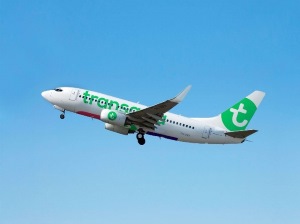Transavia Adopts Opti Climb To Reduce Aircraft Fuel Consumption During Climb
30 Mar 2016
{{vendor.Name}}
Connect with Aircraft IT
Sign up to the Aircraft IT twitter feed for all the aviation industry's latest IT related news
Click here to learn about free Membership to Aircraft IT
Transavia Adopts Opti Climb To Reduce Aircraft Fuel Consumption During Climb
After a four-month experimental phase and satisfying results, Transavia is the first airline to adopt the “green solution” that goes by the name OptiClimb, a world premiere innovation that enables aircraft to significantly reduce their fuel consumption.
OptiClimb, an innovative green solution for aviation.
 There are numerous practices intended to reduce an aircraft’s fuel consumption but against all odds, none of them addresses the climb phase, which is the most fuel-consuming phase of a flight. OptiClimb is the first solution that enables airlines to adapt and optimize their aircraft’s climb.
There are numerous practices intended to reduce an aircraft’s fuel consumption but against all odds, none of them addresses the climb phase, which is the most fuel-consuming phase of a flight. OptiClimb is the first solution that enables airlines to adapt and optimize their aircraft’s climb.
Designed in association with INRIA (French Institute for Research in Computer Science and Automation), OptiClimb uses black boxes data – which are available at zero cost – to very accurately determine and analyze each aircraft’s aerodynamic characteristics. The ideal climb profile is then determined ahead of each flight. The slight modifications in the flight path do not affect passenger safety and comfort. On a yearly basis, it can represent savings of up to several million euros, depending on the size of the airline. Applied across the industry, this could also result in a significant reduction of CO2 emissions.
Transavia: the first airline to use OptiClimb.
 Two months after the UN Climate Conference (COP21), which took place in Paris, Transavia made the choice of a greener aviation and decided to apply OptiClimb instructions to its medium-haul scheduled flights. This decision is part of Transavia’s eco-friendly approach which aims at reducing greenhouse gas emissions in air transport. Today this kind of approach is an absolute necessity. 60 million tons of CO2, the equivalent of the annual CO2 emissions of Portugal or Vietnam, would be avoided if all airlines in the world were to use OptiClimb.
Two months after the UN Climate Conference (COP21), which took place in Paris, Transavia made the choice of a greener aviation and decided to apply OptiClimb instructions to its medium-haul scheduled flights. This decision is part of Transavia’s eco-friendly approach which aims at reducing greenhouse gas emissions in air transport. Today this kind of approach is an absolute necessity. 60 million tons of CO2, the equivalent of the annual CO2 emissions of Portugal or Vietnam, would be avoided if all airlines in the world were to use OptiClimb.
A crucial international and environmental context.
Air transport accounts for about 3% of the global CO2 emissions. New ICAO CO2 rules will soon be applied. Concurrently, fuel costs represent around 30% of an airline’s operational costs. Whether it comes down to reducing fuel costs or reducing greenhouse gas emissions, finding solutions to optimize fuel consumption are a must.
